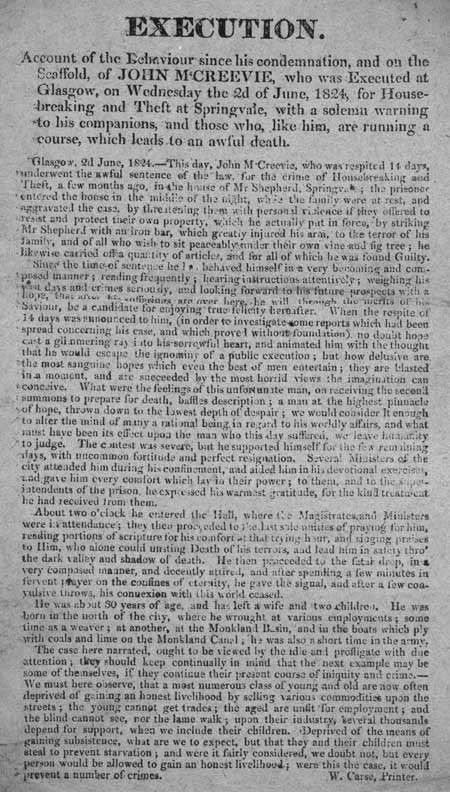Commentary
This report begins: 'Account of the Behaviour since his condemnation, and on the scaffold of John M'Creevie, who was Executed at Glasgow, on Wednesday the 2d of June, 1823, for Housebreaking and Theft at Springvale, with a solemn warning to his companions, and those who, like him, are running a course which leads to an awful death.' The sheet was published by William Carse of Glasgow, who is listed as working from various addresses in Glasgow between 1820 and 1836. This broadside tells of a man named John McCreevie, who was executed for housebreaking and theft in the village of Springvale, which is now part of the Glasgow conurbation. Although, from a modern viewpoint, the sentence appears to be harsh one, the 'Criminal Code' (called the 'Bloody Code' in England) that existed from 1650 to 1840 was primarily designed to protect property. On many occasions, however, the death sentence was commuted to one of transportation for less serious crimes. Revealingly and unusually, the final paragraph contains an emotional passage regarding why there is so much crime, and controversially concludes that unemployment and poverty is to blame. Broadsides are single sheets of paper, printed on one side, to be read unfolded. They carried public information such as proclamations as well as ballads and news of the day. Cheaply available, they were sold on the streets by pedlars and chapmen. Broadsides offer a valuable insight into many aspects of the society they were published in, and the National Library of Scotland holds over 250,000 of them.
View Transcription | Download PDF Facsimile
|
 |
Date of publication:
1824 shelfmark: L.C.Fol.73(071)
 View larger image
View larger image
|


